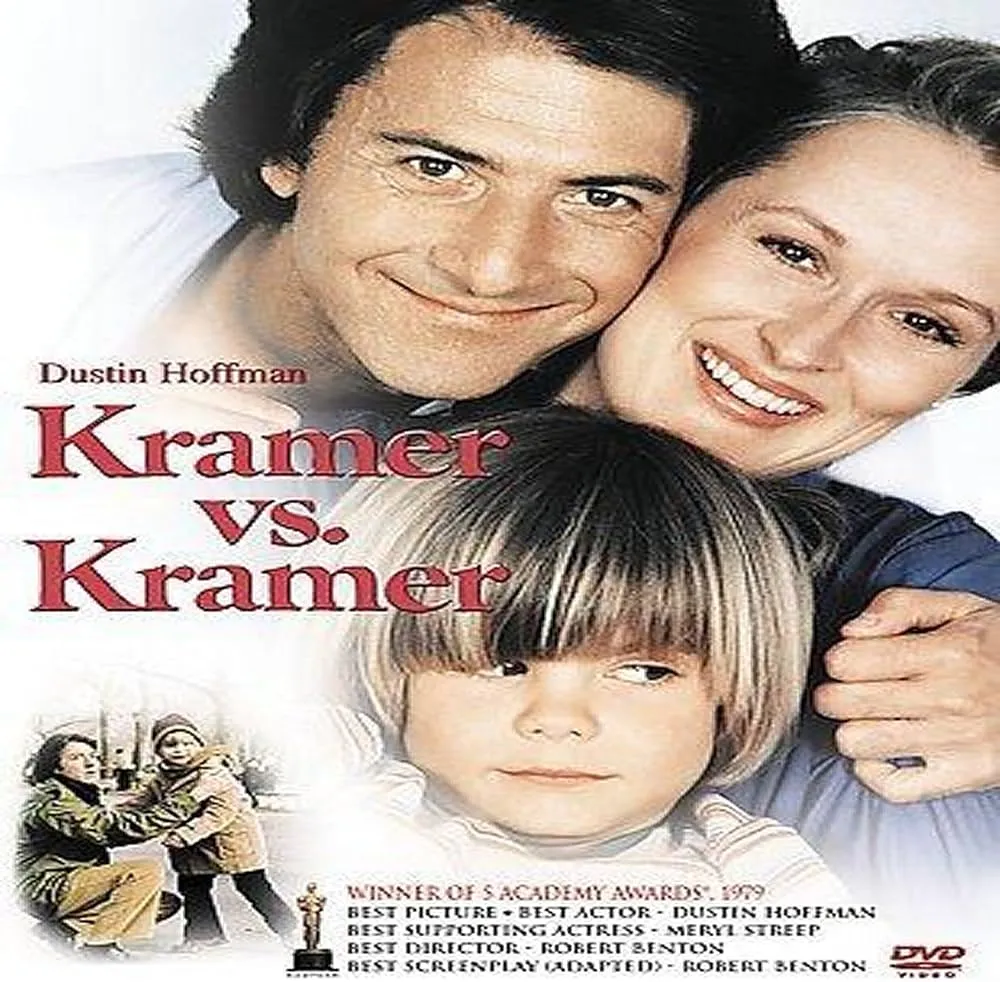
Kramer vs. Kramer is a 1979 American legal drama film directed by Robert Benton, based on Avery Corman's 1977 novel of the same name. The film stars Dustin Hoffman, Meryl Streep, Jane Alexander, and Justin Henry. It tells the story of a couple's divorce, its impact on their young son, and the subsequent evolution of their relationship and views on parenting.
The film was a major critical and commercial success, grossing over $173 million on an $8 million budget, becoming the highest-grossing film of 1979 in the United States and Canada and receiving a leading nine nominations at the 52nd Academy Awards, winning a leading five awards; Best Picture, Best Director, Best Actor (for Hoffman), Best Supporting Actress (for Streep), and Best Adapted Screenplay.
Plot
Kramer vs. Kramer is a 1979 American legal drama film that tells the story of a couple's divorce, its impact on their young son, and the subsequent evolution of their relationship and views on parenting. The film centers around Ted and Joanna Kramer, played by Dustin Hoffman and Meryl Streep.
After his wife leaves him, a work-obsessed Manhattan advertising executive is forced to learn long-neglected parenting skills, but a heated custody battle over the couple's young son deepens the wounds left by the separation.
Cast
- Dustin Hoffman as Ted Kramer
- Meryl Streep as Joanna Kramer
- Justin Henry as Billy Kramer
- Jane Alexander as Margaret Phelps
- Howard Duff as John Shaunessy
- JoBeth Williams as Phyllis Bernard
- Howland Chamberlain as Judge Atkins
- George Coe as Jim O'Connor
- Petra King as Petie Phelps
- Melissa Morell as Kim Phelps
Director: Robert Benton
Writer: Avery Corman, Robert Benton
Box Office Gross: $106,260,000
Distributor: Columbia Pictures
Genre: Drama
Release Date (Theaters): Dec 19, 1979
Release Date (Streaming): Apr 16, 2012
Themes & reception
Kramer vs. Kramer is a 1979 legal drama film that explores various themes related to family, marriage, and parenting. Some of the key themes in the film include:
- Marriage: The movie examines the challenges and difficulties that can lead to the breakdown of a marriage, as well as the efforts to save it.
- Family: The film focuses on the impact of divorce on the family unit, specifically the relationship between the parents and their son, Billy.
- Duty: The concept of duty, both in terms of parental responsibility and the responsibility to uphold marital vows, is a central theme in the film.
- Abandonment: The film explores the feelings of abandonment experienced by the characters, particularly Ted Kramer, as his wife leaves him and he is forced to take on the primary caregiving role for their son.
settings
The film Kramer vs. Kramer is primarily set in New York City, with a focus on the borough of Manhattan. Central Park is highlighted as a significant location in the story, serving as the backdrop for key events in the characters' lives, such as Billy learning to ride a bike. The setting of New York City, particularly Manhattan, contributes to the film's portrayal of urban life and the challenges faced by the characters in a bustling, metropolitan environment.
Visual Styles & techniques
The film is known for its natural and intimate visual style, which was achieved through the use of natural lighting techniques. Director Robert Benton opted for this approach to create a sense of realism and authenticity in the movie's visuals, capturing the essence of New York City and the characters' lives in a bustling urban environment. The use of natural lighting contributed to the film's emotional depth and intimate portrayal of the characters' experiences.
In addition to the natural lighting, the film employed a variety of camera angles and compositions to convey the story's emotional intensity and character dynamics. This use of cinematography allowed the filmmakers to influence the audience's reaction and interpretation of the events on screen, particularly in the context of the family's struggles and the legal battle over custody.
Trivia
Meryl Streep initially found her character, Joanna, to be almost unrealistically evil in the initial script, leading to some adjustments in the portrayal of the character.
The famous ice cream scene, where Billy challenges his father by skipping dinner and going straight for dessert, was completely improvised by Dustin Hoffman and Justin Henry. Writer and director Robert Benton liked the scene so much that he decided to keep it in the film.
The film oozes Manhattan, with Central Park being a significant location for key events in the characters' lives, such as Billy learning to ride a bike and the reunion with his mother.
Fun Fact
During the filming, the stars, Dustin Hoffman and Meryl Streep, would often, jokingly, try to get the young actor Justin Henry to pick one of them over the other. One day on the set, Hoffman asked Henry who he'd rather be with. Henry said, "Her. She's nicer," to which Hoffman replied, "Oh yeah? Work with her five weeks then see what you say". This lighthearted interaction added a touch of humor to the set despite the film's serious subject matter.